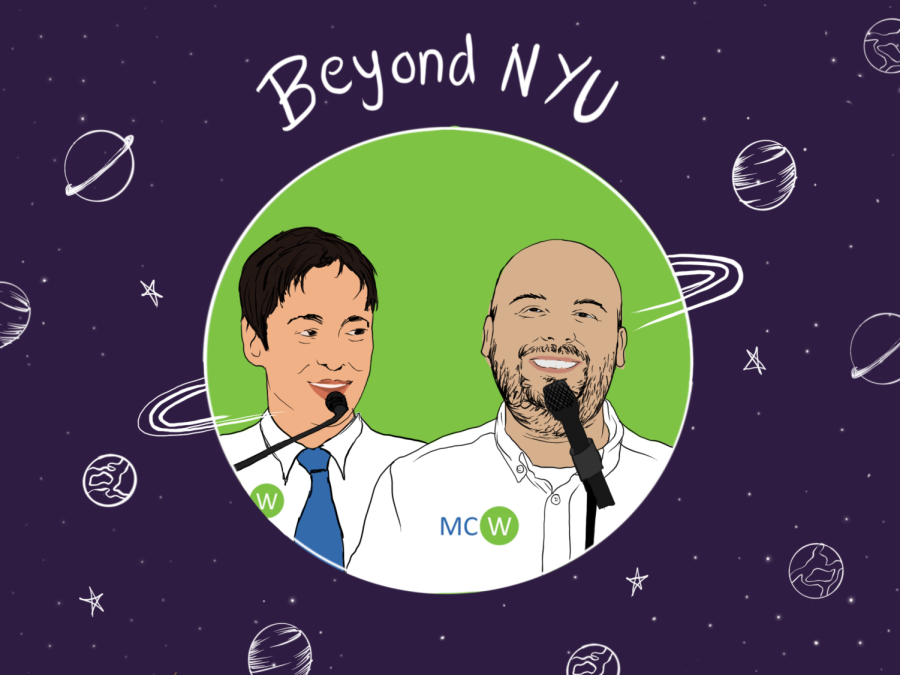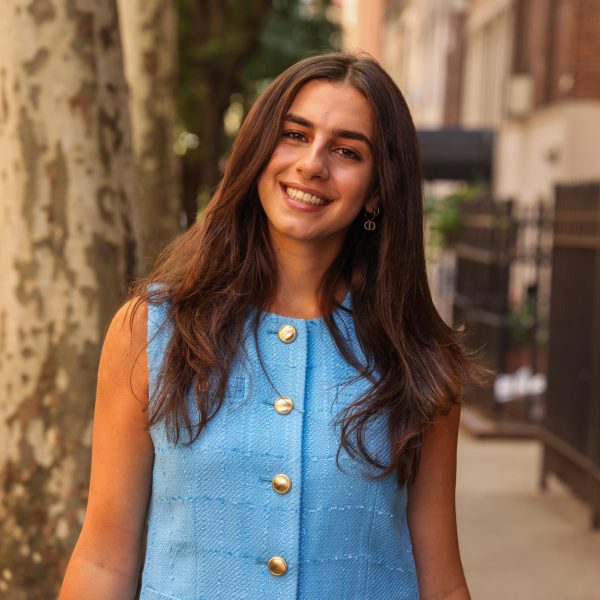Beyond NYU: Working toward worldwide access to health and education
Each week, WSN sits down with an NYU student, faculty member or alum who’s making change beyond NYU. This week, alums Eddie Bergman and Khalid Elachi share how they created MCW Global to fight against educational, economic and health related issues.
(Illustration by Aaliya Luthra)
February 9, 2023
NYU alums Eddie Bergman and Khalid Elachi are working with vulnerable communities on issues related to health, education and economics with their nonprofit organization, Miracle Corners of the World Global. MCW — which has offices and centers in New York City, Rwanda, Tanzania and Zambia — aims to strengthen communities by providing them with more opportunities for education and leadership training.
Bergman co-founded MCW in 1999 as a first-year at NYU studying hotel and tourism management at the School of Professional Studies. Elachi began volunteering with the organization as an undergraduate at NYU. A few years after he graduated in 2008, he returned to the organization, eventually becoming its executive director in March 2019. Bergman sits on the advisory boards of NYU’s Africa House, the NYU Tisch Center of Hospitality and the Gallatin School of Individualized Study.
The organization offers vocational training courses and social activities for children at its centers in Rwanda and Zambia. The Zambia location also has programs that help people improve their reading skills. At its center in Tanzania, MCW runs an oral health care program that aims to assuage the shortage of oral health workers in the country.
In an interview with WSN, Bergman and Elachi spoke about MCW’s programs, the organization’s impact on communities around the world and what they envision for the future of the nonprofit.
This interview has been edited for length and clarity.
WSN: What impact has MCW had on the communities it works with?
Elachi: When it comes to the work that we do in eastern and southern Africa, the impact is exponential. We got a young donor who was eight years old, who fundraised on her own to get books for kids in Zambia who never had books before. That simple fact that a young kid can now read a book for free at one of our community centers has exponential impact. The impact ranges from checking someone’s teeth and fixing and cavity so that they can eat, talk and smile without feeling sad about themselves, to having someone basically start their own nonprofit to support survivors of genocide in Rwanda.
WSN: How did MCW’s oral health care program start?
Bergman: My RA, who was also my roommate at the time, was Ruben Cohen — he was at the dental school — we were very good friends for two decades and he used to take part in these dental outreach programs. Ruben saw how I was traveling to Africa to work on community development programs that we were doing there. He asked if he could tag along and do a dental outreach program at a community center that we had built in Tanzania back 20 years ago. He did exactly that, and got a group of dental students and a dental professor at the time. Fast forward 20 years, we’ve transformed the oral health care system of a country.
For the last 15 years, MCW has held an annual fundraising gala at the Kimmel Center for University Life, allowing Bergman to raise money for the different projects within the organization. MCW also sponsored their first Youth Leadership Retreat — now the Young Leaders Fellowship — at NYU in 2002 for young people to learn leadership skills they can use to benefit their communities.
WSN: Has the vision for MCW changed since it was first founded?
Elachi: The goal was really to show that no matter where you come from, at the end of the day, everyone — every young person — is going through similar struggles at different levels. So by bringing everyone together from different backgrounds, you kind of create a common ground among the young people. And I think to this day, that vision still remains. It’s been refined, and we’ve developed a little bit more, but the concept of leadership stems through and weaves through all the programs that we do.
Elachi met Bergman at an event for Seeds of Peace, a peacebuilding organization which trains youth to address global challenges to equality. Bergman encouraged Elachi to apply for MCW’s Young Leaders Program, which helps individuals aged 18-26 to realize education, health and economic development plans for their communities. Elachi participated in the program and continued to volunteer with MCW during his four years at NYU before becoming more involved after graduation.
WSN: What do you envision for the future of MCW?
Elachi: One of the things that we’re trying to do over the next five years is to take everything that we are doing a step further and reach the most vulnerable. For example, we’re reaching a lot of young people who can access our programs — but what about those people who don’t have internet? Or what about those people who can’t get to the dental clinic to check their teeth?
I found out that in Rwanda, they’re doing a book library on a bicycle. So they’re taking packs of books, they’re riding around, and they’re setting up little mobile libraries for communities that don’t have access to libraries. So the next big thing for us is really going out there and touching people’s lives that we weren’t able to touch before.
WSN: How does living in New York City create opportunities for students to engage in work that aligns with MCW’s mission?
Bergman: We’ve always tried to get people out of their bubbles and interacting, working and volunteering with people that are different from them. We’ve always tried to get people to travel to places that are outside their home and out of their comfort zone — you can do this even in New York City, we are such a diverse city. Being at NYU, it’s such a remarkable opportunity that students have to be part of such a vibrant and diverse community — but they have to take advantage of the opportunity, otherwise it’s very easy to just stay in Washington Square or in classrooms.
Contact Adrianna Nehme at [email protected].

























































































































































